Information/Write-up
By the end of 1970, just months after their ramshackle debut had quietly slipped into collector legend, Christmas emerged with something altogether more focused, formidable, and forward-looking. Heritage isn’t just a second album — it’s a declaration. What began as a group of long-haired Oshawa teenagers jamming in an abandoned Air Force barracks had evolved into a fierce and unusually self-possessed rock band, fronted by the now nineteen-year-old Bob Bryden. With full creative reins in hand, Bryden led the streamlined quartet through a set of songs that showed ambition far beyond their years.
Recorded in just ten days at Toronto Sound, the album wears its urgency well. There’s no overthinking here, but there is intention. Where their debut flirted with improvisational space rock, Heritage anchors itself in sharper riffs, tighter arrangements, and a progressive sensibility that draws from British psych, Detroit crunch, and classical structure. Bryden doesn’t just write songs — he architects them. The thirteen-minute “Zephyr Song” unfolds like a mini-suite, alternating between soaring instrumental passages and brooding melodic interludes. Elsewhere, “Point Blank” blends raw nerve with lyrical unease, while the title track closes the album with a blast of pure rock propulsion — equal parts youthful swagger and calculated release.
There’s something uniquely Canadian in the album’s DNA, too. Not in any nationalistic sense, but in its slightly off-center perspective — the feeling of a band straining toward something massive without the benefit of an industry infrastructure that knew what to do with them. Even the album’s release was cursed with bad timing, hitting stores the same week as George Harrison’s All Things Must Pass. Buried under the weight of Capitol Records' priorities and misfiled in record bins as a seasonal novelty (thanks to the band’s name), Heritage never had a chance to reach the wider audience it deserved.
But that’s part of its mystique. Heritage is the kind of record that feels discovered rather than handed to you. It’s full of left turns and strange courage — a heavy, emotional, sometimes unhinged piece of teenage art rock that somehow balances earnestness with edge. Bryden’s guitar work ranges from jagged bursts to delicately layered flourishes, and his lyrics show a young writer grappling with ideas bigger than the world he was dropped into.
If the album has flaws, they’re the kind that come from ambition, not laziness. Some transitions sprawl a little too far, some themes reach just past the band's grasp — but this is precisely what makes it special. Heritage doesn’t sound like it was made to impress; it sounds like it had to be made. It’s the sound of a young band reaching as far as they could stretch, in the brief window before compromises and reality set in.
Today, Heritage stands not only as one of the great lost albums of Canadian rock, but also as a raw document of musical adolescence at its most fearless. It’s heavy, inventive, and totally sincere — a record still waiting to be discovered by the ears that need it.
-Robert Williston
Bob Bryden, 19, guitars, all vocals, piano, organ, harpsichord, electric harpsichord, celeste, and miscellaneous effects
Robert Bulger, 18, guitars
Tyler Raizenne, 16, bass and electric zombie
Rich Richter, 16, drums and embryonic whimper
Backstage:
Ralph the man, Clay
Brian “Fats” Bulger
Chad Powlenzuk
Jayb and his moll
Wally the hungry volcano
Special considerations:
Wolfgang Michael Hryciuk
The lovely Linda Squires — for the handshakes, cokes, management and money
Walt Grealis — for the encouraging words
John Donabie — for the tomato ketchup
Wayne Patton — for his wealth of enthusiasm
Album title by Joe Gallant
All songs written and arranged by Bob Bryden
Engineered by Terry Brown, with Paul Reagin, Nicky Jabour, assisted by Peter Houston
Recorded at Toronto Sound, October, 1970
Design and packaging by Paul Weldon in association with Daffodil
Photography by Annette Yorke
A production of LOVE
Liner notes:
The Group:
Christmas is not, you'll probably concede, a likely choice of names for a rock group. But Christmas is not really like a group.
The average age of the four members of Christmas is a mere 17, yet lest this should deter you, we should point out very quickly that they make music many players fully ten years their senior have not yet dreamed of making.
Lead singer and composer, Bob Bryden, thought up the name a year before he put Christmas together on December 25, 1969. At the time, it seemed to fit. “Although our music is heavy, it is also optimistic. In part, it’s peaceful, and it is something to get into the spirit of.”
We felt the same way when we first heard Christmas music, in a rotting, disused air force barracks building on the outskirts of Oshawa, Ontario.
It was a cloudy afternoon, and the weeds around the building were high and healthy from the months of summer sun.
We were jammed into one small room at the end of the building, and the music was louder than hell but it was very relaxing. You weren’t being browbeaten or bashed around the ears. Indeed, when we walked out into that cloudless afternoon and looked across the criss-crossing air strips, there was a strange feeling of joy and electricity. We felt as though we’d heard something very very special.
We explored further, and as the leaves turned red across the Southern Ontario flatlands, we spent long and fascinating nights in the studio recording this album. That initial feeling we’d had at the Oshawa air force base never left us.
The flatlands are white now with the first snows, and the fires are burning in the red bricks and we’re listening to the album. We still cannot believe the depth and definition of these four young musicians. We do believe, though humbly, that this is the most original music to ever come out of the north country.
We sit before our fires, gazing into the flames, and wonder how it is that such young musicians have so much insight and understanding. And so much balls.
We reflect on the unlikeliness of Christmas, and its four members — the 16-year old drummer, Richard Richter, the bass player, Tyler Reizanne who’s also 16, the 18-year old lead guitarist, Robert Bulger and the 19-year old guitarist-writer-inspirational leader, Bob Bryden.
Such a union is as fragile as an early snowfall on still-yellow leaves, as sensitive as the look of belief in a young couples’ eyes, and yet as strong as the unmortared stones in a Roman aqueduct.
We know it will grow, just as the snow melts and the ground dries up.
We feel these strange vibrations and we know they will not elude you.
We have confidence and ears and hearts and a longing to know more.
Christmas, after all, is something to get into the spirit of....
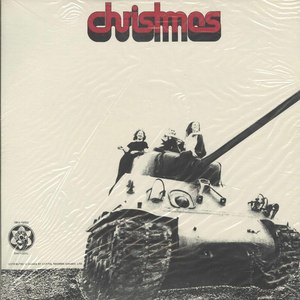
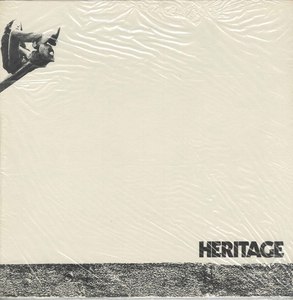
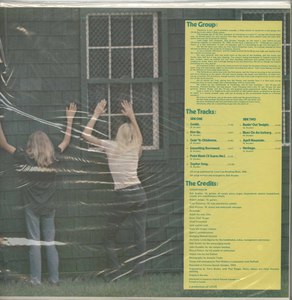
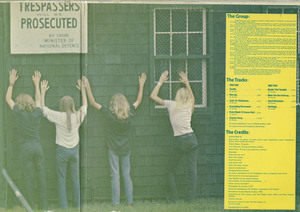
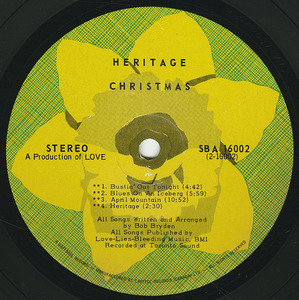
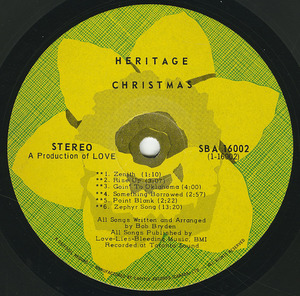
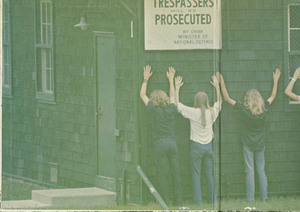

No Comments